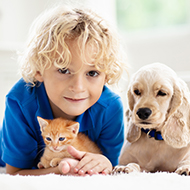
RSPCA urges pet owners to seek out resources and support.
New data published by the Pet Food Manufacturers’ Association (PFMA) has confirmed that 3.2 million households in the UK have acquired a pet since the start of the pandemic.
There are now 34 million pets in the UK, including 12 million cats, 12 million dogs, 3.2 million small mammals, three million birds and 1.5 million reptiles.
Although 74 per cent of the PFMA's survey respondents has said that their pet has helped their mental health through the pandemic, more than a third of new owners compared having a new pet to having a new baby.
Similarly, 17 per cent of families with children admitted that training had been more challenging than expected and five per cent of respondents have already had to give up a pet (11 per cent among families).
Dr Samantha Gaines from the RSPCA said: “As these figures demonstrate, a huge number of people have added a new pet to their family during lockdown while other pet owners have made the most of spending more time at home during the pandemic to enjoy the company of their pets.
“Many of our pets are now used to having us around all the time while others have never known any different so we have real concerns that life post-lockdown, both in terms of a new routine and spending time alone, could be really difficult for them to adjust to which is why it’s so important that owners start to prepare them now. In the absence of this preparation, pets could be facing their own crisis.”



 The Veterinary Medicines Directorate (VMD) is inviting applications from veterinary students to attend a one-week extramural studies (EMS) placement in July 2026.
The Veterinary Medicines Directorate (VMD) is inviting applications from veterinary students to attend a one-week extramural studies (EMS) placement in July 2026.